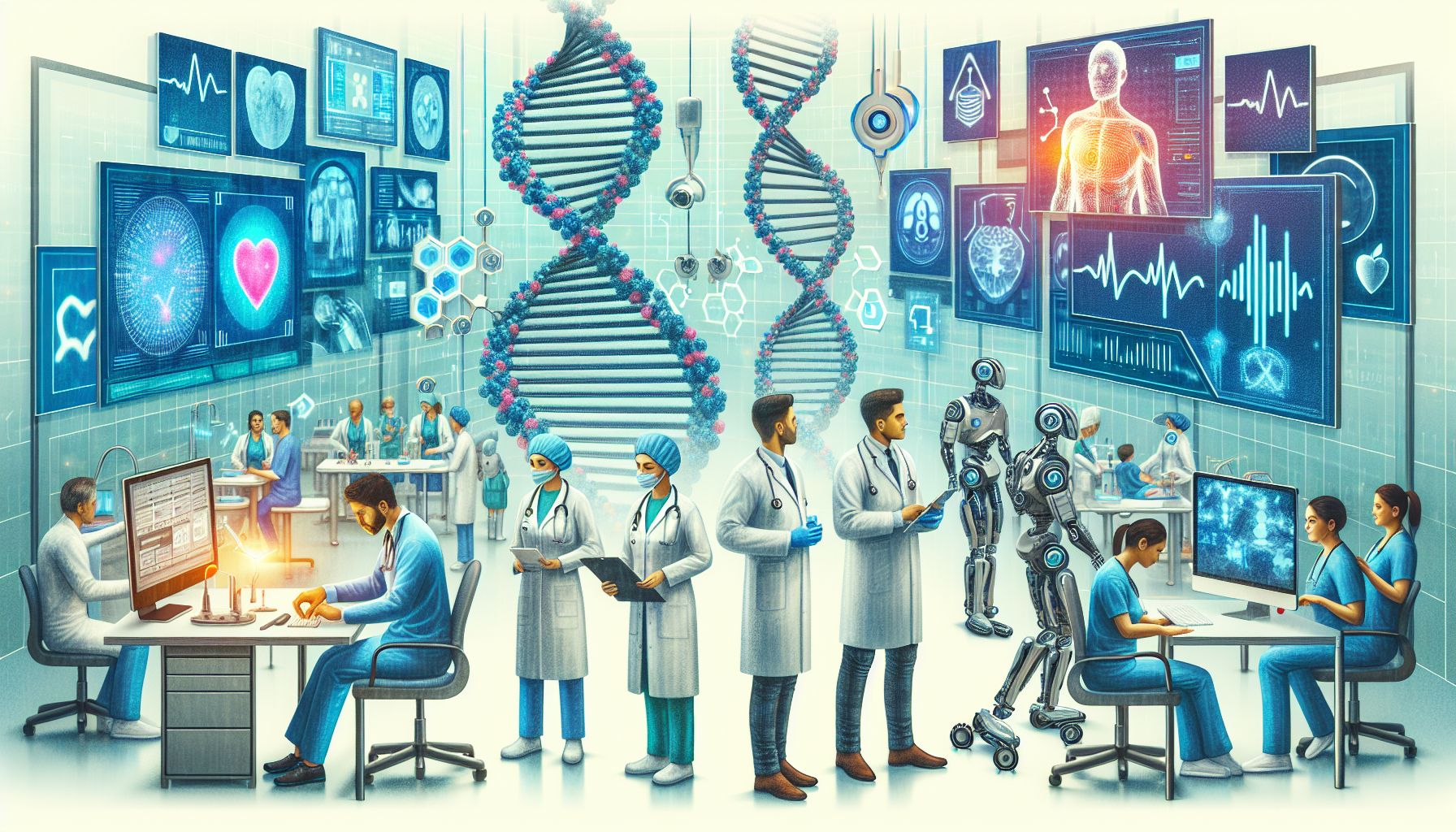📌 Let’s explore the topic in depth and see what insights we can uncover.
⚡ “Imagine a doctor who never sleeps, never misses a symptom, and never forgets a patient’s history. Welcome to the era of AI in healthcare, ushering in medical marvels that felt like pure science fiction just a decade ago.”
Welcome to the future, where your doctor is an AI-powered machine and your health is monitored 24/7 by smart algorithms. Sounds like science fiction? Well, it’s time to update your reality because this is rapidly becoming the new normal. The healthcare industry is experiencing a revolution, and Artificial Intelligence (AI) is at the forefront of this transformation. In this blog post, we will explore the exciting ways AI is shaping the future of healthcare. We will delve into how it’s improving diagnostics, revolutionizing patient care, and streamlining administrative tasks. We will also discuss the challenges that lie ahead and how we can navigate them for a healthier future. So, fasten your seatbelts because we’re about to embark on a fascinating journey into the world of AI in healthcare.
🎯 AI in Diagnostics: A New Era of Precision and Accuracy

"AI: The Heartbeat of Future Healthcare"
AI has the potential to revolutionize the field of diagnostics. Its ability to analyze vast amounts of data faster and more accurately than humans can greatly improve diagnostic precision. Imagine a world where diseases like cancer could be detected at their earliest stages, increasing the chances of successful treatment. That’s the power of AI in diagnostics. For instance, Google’s DeepMind has developed an AI system that can diagnose over 50 eye diseases as accurately as a doctor. It uses deep learning algorithms to analyze 3D retinal scans, helping to detect and prevent irreversible blindness. Similarly, IBM’s Watson is being used in oncology to provide personalized treatment plans for cancer patients. Watson analyzes the patient’s medical history and compares it with vast amounts of clinical research data to recommend the most effective treatment options.
🩺 AI in Patient Care: Personalized and Proactive
AI is not only helping diagnose diseases but also enhancing patient care. With the rise of wearable technology and IoT devices, AI can constantly monitor a patient’s health and provide personalized care. AI-powered apps like Ada and Your.MD are providing personalized medical advice to patients, guiding them on when to see a doctor and what steps to take for their symptoms. These apps use AI algorithms to analyze the patient’s symptoms and medical history, providing a personalized assessment and advice. Moreover, AI is also facilitating proactive health management. For example, Apple’s Watch Series 4 has an ECG feature that uses AI to detect irregular heart rhythms, potentially saving lives by alerting users to seek medical help before a serious condition develops.
📋 AI in Administration: Streamlining the Backend
AI is not only transforming patient care and diagnostics, but it’s also reshaping the administrative side of healthcare. Healthcare administration is often mired in paperwork, resulting in inefficiencies and delays. But AI has the potential to streamline these processes, freeing up healthcare professionals to focus on patient care. For example, Olive AI uses robotic process automation to handle repetitive administrative tasks such as patient pre-registration and billing. This not only improves efficiency but also reduces the risk of human error. Similarly, AI chatbots are being used to handle patient inquiries, schedule appointments, and provide health advice. This not only improves patient satisfaction by providing instant responses, but it also reduces the workload of healthcare staff.
💡 Navigating the Challenges: Ethical and Practical Considerations
While the potential of AI in healthcare is immense, it also presents several challenges. The most significant of these is data privacy. As AI systems require large amounts of data to operate effectively, ensuring this data is collected, stored, and used ethically is paramount. Another challenge is the potential for AI to dehumanize healthcare. While AI can perform many tasks more efficiently than humans, it lacks the human touch that is often crucial in healthcare. Ensuring that AI complements rather than replaces human healthcare professionals is key to its successful implementation. Moreover, there is the challenge of ensuring that the benefits of AI in healthcare are accessible to all. As AI technology is costly, there is a risk that it could widen health disparities if only those who can afford it have access.
🧭 Conclusion: The Future is Now
The impact of AI on healthcare is profound and far-reaching. By improving diagnostics, enhancing patient care, and streamlining administrative tasks, AI is transforming healthcare as we know it. But like any powerful tool, it must be used responsibly. As we navigate the challenges, it’s important to ensure that the use of AI in healthcare is ethical, human-centered, and equitable. The future of healthcare is not a distant reality, but a present truth. AI is already here, shaping our health and wellbeing in ways we could only dream of a few years ago. As we embrace this brave new world of AI-powered healthcare, we are not only creating a healthier future but also a more efficient and personalized healthcare system. So, whether you are a healthcare professional, a patient, or simply a curious reader, it’s time to embrace the AI revolution. Because in this digital age, staying informed is not just about keeping up with the times, it’s about staying healthy.
⚙️ Join us again as we explore the ever-evolving tech landscape.
